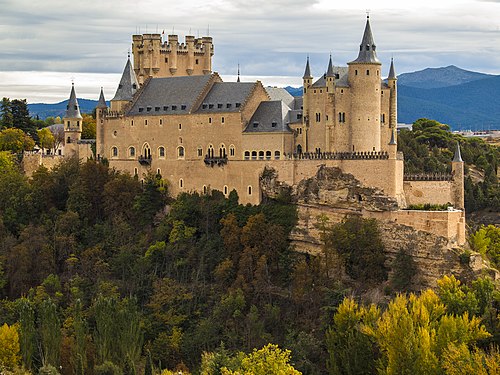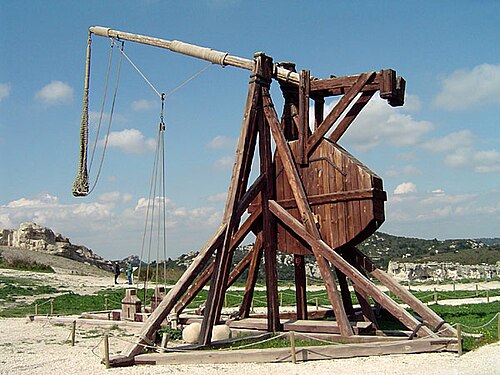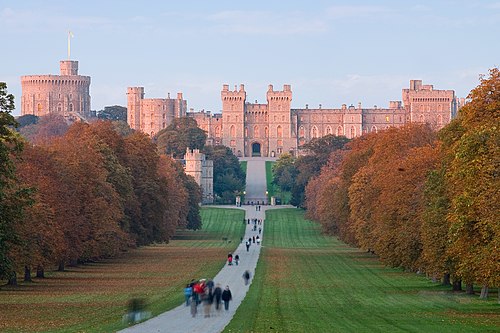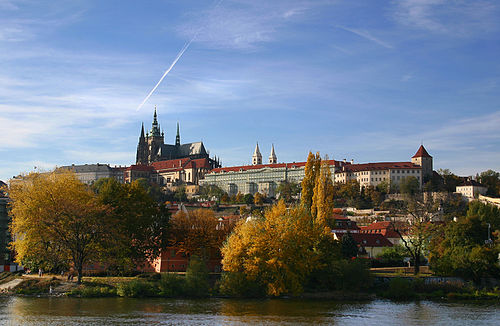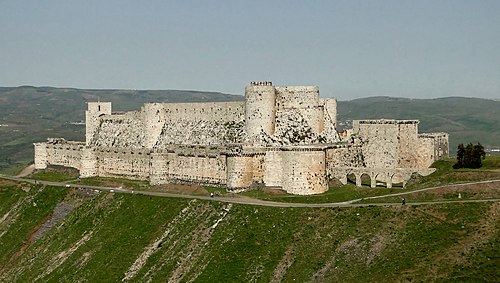Castlenoun
A large building that is fortified and contains many defences; in previous ages often inhabited by a nobleman or king.
Castlenoun
(chess) An instance of castling.
Castlenoun
A rook; a chess piece shaped like a castle tower.
Castlenoun
(shogi) A defense structure in Japanese chess in which the king (玉) is positioned in a certain way so that it is protected by pawns (歩) and silver general(s) (銀) and/or gold general(s) (金) often with an additional knight (桂) and lance (香車).
Castlenoun
(obsolete) A close helmet.
Castlenoun
(dated) Any strong, imposing, and stately mansion.
Castlenoun
(dated) A small tower, as on a ship, or an elephant's back.
Castleverb
(transitive) To house or keep in a castle.
Castleverb
To protect or separate in a similar way.
Castleverb
(obsolete) To make into a castle: to build in the form of a castle or add (real or imitation) battlements to an existing building.
Castleverb
To move the king 2 squares right or left and, in the same turn, the nearest rook to the far side of the king. The move now has special rules: the king cannot be in, go through, or end in check; the squares between the king and rook must be vacant; and neither piece may have been moved before castling.
Castleverb
To create a similar defensive position in Japanese chess through several moves.
Castleverb
(cricket) To bowl a batsman with a full-length ball or yorker such that the stumps are knocked over.
Castlenoun
A fortified residence, especially that of a prince or nobleman; a fortress.
Castlenoun
Any strong, imposing, and stately mansion.
Castlenoun
A small tower, as on a ship, or an elephant's back.
Castlenoun
A piece, made to represent a castle, used in the game of chess; a rook.
Castleverb
To move the castle to the square next to king, and then the king around the castle to the square next beyond it, for the purpose of covering the king.
Castlenoun
a large and stately mansion
Castlenoun
a large building formerly occupied by a ruler and fortified against attack
Castlenoun
(chess) the piece that can move any number of unoccupied squares in a direction parallel to the sides of the chessboard
Castlenoun
interchanging the positions of the king and a rook
Castleverb
move the king two squares toward a rook and in the same move the rook to the square next past the king
Castle
A castle is a type of fortified structure built during the Middle Ages predominantly by the nobility or royalty and by military orders. Scholars debate the scope of the word castle, but usually consider it to be the private fortified residence of a lord or noble.
Keepverb
To continue in (a course or mode of action); not to intermit or fall from; to uphold or maintain.
Keepverb
To hold the status of something.
Keepverb
To maintain possession of.
Keepverb
To maintain the condition of.
Keepverb
(transitive) To record transactions, accounts, or events in.
Keepverb
(transitive) To enter (accounts, records, etc.) in a book.
Keepverb
(archaic) To remain in, to be confined to.
Keepverb
To restrain.
Keepverb
(with from) To watch over, look after, guard, protect.
Keepverb
To supply with necessities and financially support a person.
Keepverb
(of living things) To raise; to care for.
Keepverb
To maintain (an establishment or institution); to conduct; to manage.
Keepverb
To have habitually in stock for sale.
Keepverb
To hold or be held in a state.
Keepverb
(obsolete) To reside for a time; to lodge; to dwell.
Keepverb
To continue.
Keepverb
To remain edible or otherwise usable.
Keepverb
(copulative) To remain in a state.
Keepverb
(obsolete) To wait for, keep watch for.
Keepverb
To act as wicket-keeper.
Keepverb
To take care; to be solicitous; to watch.
Keepverb
To be in session; to take place.
Keepverb
(transitive) To observe; to adhere to; to fulfill; not to swerve from or violate.
Keepverb
To confine oneself to; not to quit; to remain in.
Keepverb
To visit (a place) often; to frequent.
Keepnoun
(obsolete) Care, notice
Keepnoun
(historical) The main tower of a castle or fortress, located within the castle walls.
Keepnoun
The food or money required to keep someone alive and healthy; one's support, maintenance.
Keepnoun
The act or office of keeping; custody; guard; care; heed; charge.
Keepnoun
The state of being kept; hence, the resulting condition; case.
Keepnoun
(obsolete) That which is kept in charge; a charge.
Keepnoun
(engineering) A cap for holding something, such as a journal box, in place.
Keepverb
To care; to desire.
Keepverb
To hold; to restrain from departure or removal; not to let go of; to retain in one's power or possession; not to lose; to retain; to detain.
Keepverb
To cause to remain in a given situation or condition; to maintain unchanged; to hold or preserve in any state or tenor.
Keepverb
To have in custody; to have in some place for preservation; to take charge of.
Keepverb
To preserve from danger, harm, or loss; to guard.
Keepverb
To preserve from discovery or publicity; not to communicate, reveal, or betray, as a secret.
Keepverb
To attend upon; to have the care of; to tend.
Keepverb
To record transactions, accounts, or events in; as, to keep books, a journal, etc.; also, to enter (as accounts, records, etc. ) in a book.
Keepverb
To maintain, as an establishment, institution, or the like; to conduct; to manage; as, to keep store.
Keepverb
To supply with necessaries of life; to entertain; as, to keep boarders.
Keepverb
To have in one's service; to have and maintain, as an assistant, a servant, a mistress, a horse, etc.
Keepverb
To have habitually in stock for sale.
Keepverb
To continue in, as a course or mode of action; not to intermit or fall from; to hold to; to maintain; as, to keep silence; to keep one's word; to keep possession.
Keepverb
To observe; to adhere to; to fulfill; not to swerve from or violate; to practice or perform, as duty; not to neglect; to be faithful to.
Keepverb
To confine one's self to; not to quit; to remain in; as, to keep one's house, room, bed, etc.; hence, to haunt; to frequent.
Keepverb
To observe duly, as a festival, etc.; to celebrate; to solemnize; as, to keep a feast.
Keepverb
To remain in any position or state; to continue; to abide; to stay; as, to keep at a distance; to keep aloft; to keep near; to keep in the house; to keep before or behind; to keep in favor; to keep out of company, or out reach.
Keepverb
To last; to endure; to remain unimpaired.
Keepverb
To reside for a time; to lodge; to dwell.
Keepverb
To take care; to be solicitous; to watch.
Keepverb
To be in session; as, school keeps to-day.
Keepnoun
The act or office of keeping; custody; guard; care; heed; charge.
Keepnoun
The state of being kept; hence, the resulting condition; case; as, to be in good keep.
Keepnoun
The means or provisions by which one is kept; maintenance; support; as, the keep of a horse.
Keepnoun
That which keeps or protects; a stronghold; a fortress; a castle; specifically, the strongest and securest part of a castle, often used as a place of residence by the lord of the castle, especially during a siege; the dungeon. See Illust. of Castle.
Keepnoun
That which is kept in charge; a charge.
Keepnoun
A cap for retaining anything, as a journal box, in place.
Keepnoun
the financial means whereby one lives;
Keepnoun
the main tower within the walls of a medieval castle or fortress
Keepnoun
a cell in a jail or prison
Keepverb
keep in a certain state, position, or activity; e.g.,
Keepverb
continue a certain state, condition, or activity;
Keepverb
retain possession of;
Keepverb
prevent from doing something or being in a certain state;
Keepverb
conform one's action or practice to;
Keepverb
observe correctly or closely;
Keepverb
look after; be the keeper of; have charge of;
Keepverb
maintain by writing regular records;
Keepverb
supply with room and board;
Keepverb
allow to remain in a place or position;
Keepverb
supply with necessities and support;
Keepverb
fail to spoil or rot;
Keepverb
celebrate, as of holidays or rites;
Keepverb
keep under control; keep in check;
Keepverb
maintain in safety from injury, harm, or danger;
Keepverb
raise;
Keepverb
retain rights to;
Keepverb
store or keep customarily;
Keepverb
have as a supply;
Keepverb
maintain for use and service;
Keepverb
hold and prevent from leaving;
Keepverb
prevent (food) from rotting;
Keep
A keep (from the Middle English kype) is a type of fortified tower built within castles during the Middle Ages by European nobility. Scholars have debated the scope of the word keep, but usually consider it to refer to large towers in castles that were fortified residences, used as a refuge of last resort should the rest of the castle fall to an adversary.
























